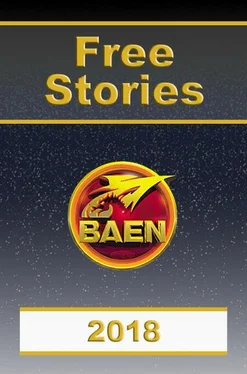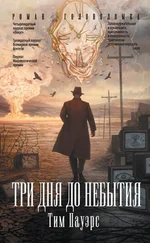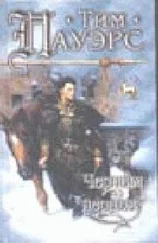It was second watch, and Goond was the first watch officer. So he yielded the control center to ZweiVo Sclarvie and went forward to the wardroom, where he could snuggle up close to the bulkhead and keep an ear out for anything happening in the radio room. Lachs had told him all about the hail for “U-818 Lachs” and Goond had been sorry he’d missed it, but they hadn’t caught the same hail again since then, though the radio operators had been looking.
There was plenty of radio traffic, but of limited usefulness, someone’s casserole, someone’s new antenna or equipment, whether or not sporadic “e” was open for skywave propagation. It was exhausting, trying to make sense of it all.
He closed his eyes. Then he heard Lachs give the order to surface, and opened them again, sitting up with interest. The watch was called topside. They did not come tumbling down again immediately; so after a moment he went up to join Lachs on the bridge.
“There’s a small boat tethered to port,” Lachs told him. “With no lights. And very little evidence of any movement otherwise. I thought we might send a small boarding party, introduce ourselves. There’s a pumproom forward that will do the trick for us, do I remember that right?”
And the galley had been immediately below officer’s quarters which had been in turn below the bridge deck, with the store-rooms below that. Oh, the store-rooms. They’d been like Christmas morning, after weeks on a U-boat. “Just as you say, Herr Kahloin. A few men to secure the tethered boat in case there is an alarm, and seven or eight up the other side, I wonder?”
Lachs nodded, smiling, though his grin was but dimly glimpsed in the dark, half-masked as it was already by a week’s growth of beard. “I will await your gleanings, if there are any. Your action, EinsVo.”
No more needed to be said.
Within the hour their largest inflatable had been secured to the starboard side of the freighter where the anchor-point was in easy reach of the ladder going up, and Goond’s kommando were going up it. He’d brought a pistol; for the rest, they would rely on surprise and sheer body heft, because Goond had drawn some crew from the torpedo room and those men were accustomed to managing the heavy and ungainly “eels” in all manner of conditions. Men weighed much less, and required less careful handling; it was much less important if men were damaged.
There were some external lights along the wall of the bridge deck, but no sound; all doors, disappointingly, secured, except for the last one they checked—small, and possibly forgotten by people not particularly concerned to guard against intruders, and it was the last door they’d checked simply because of course once they’d found it they stopped checking and went in.
There was a narrow ladder-stair leading upwards, a feeble light in a metal cage, and all signs pointed to a disused passageway which was just as Goond liked it. He went up, and his kommando followed: so far, all reassuringly familiar. There was the galley, dark, silent, cold; that was odd, but since they hadn’t seen any crew thus far—the ship apparently running along with a skeleton crew—perhaps only cold meals were being taken?
Three of his men were in charge of taking stock of ship’s stores. Goond took five with him up the next flights to the bridge, because surely there was at least a night-watchman on the bridge as well as one making rounds, and he was hoping for the cooperation of reasonably-minded men to hurry the refueling mission along. If the ship had any diesel. Had it not, Goond supposed they could draw from ship’s own tanks, but that problem would wait its turn.
On the third level up it was warm and comparatively bright when they opened the door, so Goond knew at once that they were on the bridge deck. Through the narrow corridor, forward, and there was a door propped open at the end of the second stretch; Goond stepped to one side of the light spilling out of the bridge to take a cautious survey.
It was larger than he’d expected. He could recognize enough of the equipment consoles to confirm that this was the nerve center of the ship, but there was much that he didn’t recognize at all, and a great deal of information was apparently displayed on small screens no larger than the open-paged extent of a large atlas, like a tiny movie: but with no projectors that Goond could detect, at first sight. And quiet.
There was only one man there, and he was most comfortably disposed with his hands clasped behind his neck and his feet up on the desk or table in front of him. Goond cleared his voice, and the man nearly fell out of his chair in astonishment, stumbling to his feet to turn and face Goond.
“Good evening,” Goond said politely. His English was not so good as Lachs’, or that of several others on board, if it came to that. But he had done his advanced courses, and his training cruise as well: he was confident of his ability to get his message across. “We would like a drink from your diesel, please. If you’ve got any. Are you the watch officer?”
Goond himself had not changed for the occasion, so what rank he wore on his old jacket was not perhaps in such impressive condition if a person didn’t know how to interpret it. And they were sixty years into the future. And the war was over. There was no reason to assume that the tanker’s watch officer knew what Goond’s rank markers meant. Goond was relying on his unannounced appearance with a party of men to communicate a degree of gravitas in its own right.
“Uh,” the man said. He was as young as Feufel, who claimed to be nineteen but who was probably younger than that; and clean-shaven, but one could do that, on a tanker. There would be showers. Perhaps even a laundry, and almost certainly bake-ovens for fresh bread, but Goond focused his attention with a stern effort. Showers and laundry were not for them. “I, ah, yeah. Watch officer. Jonesie. I wasn’t expecting you until tomorrow, change of plan? Where’s Kalf?”
Goond noted the young man’s quick glance toward a console once removed where an unholstered pistol lay on the angled desk before one of the movie-screens. So there was a Kalf, and possibly armed. That was a data point. Also there was a party of men expected: and Jonesie didn’t know them on sight. There was a chance of getting U-818’s business done and getting clear before their imposture was recognized, then, if they could act convincingly.
“We didn’t see him. So we came up on our own.” True things made the best deceptions. “Is there someone to help my men with the pumps?” Jonesie hadn’t said no to diesel. So there was diesel. “Or if you would just point them in the right direction, assuming we need no keys.”
U-818 was standing by. Ellie was on the bridge, waiting to supervise refueling. It was going to make adjusting the trim of the boat a little more complicated. They were heavy enough as it was, with the thinness of fresh water taken into account.
Now with a mixture of confusion and proud competence Jonesie turned toward one of the consoles. There was a keyboard. It ran the movie. “Ah, no alarms, no keys,” Jonesie said. Goond suddenly recognized the movie: it was the forward pumproom of a T2 tanker, with lights coming up as he watched.
It wasn’t a movie. It was live-broadcast television, “TV,” and the technology was clearly advanced further than he had extrapolated from the radio announcements he’d been hearing if a tanker as old as this could afford to broadcast to the bridge from multiple locations all over the ship. “Need any help?”
There was a clear note of “I hope not” in Jonesie’s voice that made Goond smile, inside. “We’ve done this before,” he said. “We’ll be fine.” From here he could drop back into German, for a moment at least.
Читать дальше








![Тим Пауэрс - Последние дни. Том 2 [litres]](/books/393813/tim-pauers-poslednie-dni-tom-2-litres-thumb.webp)
![Тим Пауэрс - Последние дни. Том 1 [litres]](/books/394090/tim-pauers-poslednie-dni-tom-1-litres-thumb.webp)
![Тим Пауэрс - Последний выдох [litres]](/books/402145/tim-pauers-poslednij-vydoh-litres-thumb.webp)